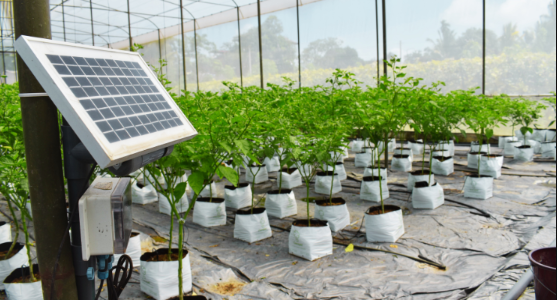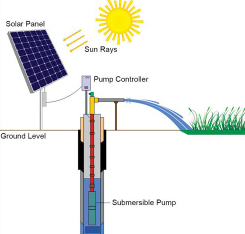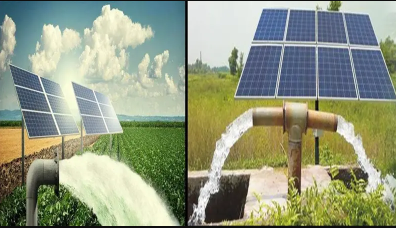Solar-Powered AI Irrigation Systems for Sustainable Agriculture
 Sathya Kannan
Sathya Kannan
In recent years, the agricultural industry has witnessed a transformative shift toward more sustainable practices, with technology playing a crucial role in the evolution of farming methods. One of the most innovative developments in this space is the integration of solar-powered artificial intelligence (AI) irrigation systems. These systems combine renewable energy, cutting-edge AI, and efficient water management techniques to revolutionize agriculture, making it more sustainable, resource-efficient, and cost-effective. This article explores how solar-powered AI irrigation systems are paving the way for the future of agriculture and addressing some of the most pressing challenges faced by the industry today.
The Need for Sustainable Agriculture
As the global population continues to grow, so does the demand for food, placing immense pressure on agricultural systems to produce more with fewer resources. At the same time, traditional farming practices have led to several environmental challenges, including water scarcity, soil degradation, and the overuse of fertilizers and pesticides. According to the United Nations, agriculture accounts for approximately 70% of global freshwater use, making efficient water management a critical issue in the quest for sustainable farming.
The traditional irrigation methods, such as flood irrigation, can waste large amounts of water and energy, particularly in arid and semi-arid regions. Moreover, the excessive use of water resources in agriculture often leads to the depletion of water tables and the degradation of surrounding ecosystems. To address these issues, the adoption of sustainable technologies like solar-powered AI irrigation systems has become essential for the long-term viability of agriculture.
EQ 1. Water Irrigation Requirement Calculation (AI-based optimization)

How Solar-Powered AI Irrigation Systems Work
Solar-powered AI irrigation systems are a fusion of two powerful technologies: solar energy and artificial intelligence. Solar energy serves as the renewable power source that drives the system, while AI algorithms enable efficient water management and precise irrigation control. These systems consist of several key components:
Solar Panels: Solar panels are installed on-site to capture sunlight and convert it into electricity. This energy is used to power the irrigation system, reducing reliance on grid electricity and making the system eco-friendly and cost-effective in the long run.
Sensors: These systems are equipped with various sensors, such as soil moisture sensors, temperature sensors, and weather sensors. These sensors collect real-time data on environmental conditions, including soil moisture levels, temperature, humidity, and weather patterns, which are crucial for determining the water needs of crops.
Artificial Intelligence: AI algorithms process the data collected by the sensors and make real-time decisions about when and how much water should be applied to the crops. These algorithms take into account factors such as soil moisture levels, weather forecasts, and crop type to optimize irrigation schedules. By leveraging AI, the system can adjust irrigation in real-time based on changing environmental conditions, ensuring that crops receive the right amount of water at the right time.
Automated Irrigation System: The automated irrigation system can be in the form of drip irrigation or sprinkler systems. Once the AI system determines the optimal amount of water required, it activates the irrigation system to deliver the precise amount of water to the crops, reducing water waste and ensuring efficient usage.

The Benefits of Solar-Powered AI Irrigation Systems
Water Conservation: One of the most significant benefits of solar-powered AI irrigation systems is water conservation. Traditional irrigation systems often rely on manual scheduling or fixed schedules, which do not account for variations in weather or soil conditions. This can lead to over-irrigation, resulting in water waste and inefficient use of resources. By using real-time data and AI algorithms, solar-powered irrigation systems can adjust watering schedules based on actual soil moisture levels and weather forecasts, ensuring that crops receive only the water they need. This results in substantial water savings, which is particularly important in regions facing water scarcity.
Cost Efficiency: Solar-powered irrigation systems significantly reduce the costs associated with energy consumption. Unlike conventional irrigation systems that rely on electricity or fuel-powered pumps, solar-powered systems use free and renewable solar energy. This not only reduces energy costs but also eliminates the need for ongoing fuel purchases, making these systems a more cost-effective option for farmers in the long run.
EQ 2. Energy Consumption for Solar-Powered Irrigation System

Sustainability: By harnessing solar energy, these irrigation systems help reduce the carbon footprint of agriculture. Solar power is a clean and renewable source of energy, unlike fossil fuels, which contribute to greenhouse gas emissions and climate change. In addition to reducing carbon emissions, solar-powered irrigation systems help mitigate the impact of water-intensive agricultural practices on the environment.
Increased Crop Yield and Efficiency: AI-powered irrigation systems ensure that crops receive the optimal amount of water, which is essential for maximizing crop yield. Over- or under-irrigating crops can lead to poor growth and reduced yields. By precisely controlling irrigation schedules and avoiding water stress, solar-powered AI systems can help farmers achieve higher productivity and better-quality crops.
Data-Driven Decision Making: The integration of AI and sensors allows farmers to make data-driven decisions about irrigation and overall crop management. The continuous collection of data provides insights into soil health, weather patterns, and crop performance, helping farmers optimize their practices and improve their overall farm management. This data can also be used to predict future trends, allowing farmers to anticipate challenges and plan accordingly.
Remote Monitoring and Control: Solar-powered AI irrigation systems can be remotely monitored and controlled through mobile apps or web interfaces. This allows farmers to access real-time data and manage irrigation systems from anywhere, even if they are miles away from their fields. Remote monitoring is particularly beneficial for large-scale farms or farms located in remote areas, where access to on-site labor may be limited.

Challenges and Considerations
Despite the numerous advantages, there are some challenges and considerations to keep in mind when implementing solar-powered AI irrigation systems. The initial installation cost of solar panels, sensors, and AI infrastructure can be significant, especially for small-scale farmers. However, the long-term cost savings, reduced water usage, and increased crop yields often outweigh the initial investment.
Another challenge is the need for reliable internet connectivity in remote agricultural areas. For AI systems to function effectively, they require continuous data transmission and access to cloud computing resources. In regions with poor internet connectivity, this could pose a limitation to the widespread adoption of these systems.
Furthermore, while solar-powered irrigation systems can reduce water usage, they are not a one-size-fits-all solution. The effectiveness of the system depends on factors such as geographic location, crop type, and weather conditions. Farmers need to assess the specific needs of their farms to determine whether solar-powered AI irrigation is a viable solution for their operations.

Conclusion
Solar-powered AI irrigation systems represent a groundbreaking innovation in sustainable agriculture, offering significant benefits in terms of water conservation, cost efficiency, and environmental sustainability. By leveraging solar energy and artificial intelligence, these systems provide farmers with the tools they need to optimize irrigation, increase crop yields, and reduce their environmental impact. While there are challenges to overcome, the long-term potential of solar-powered AI irrigation systems to revolutionize agriculture and contribute to a more sustainable food production system is immense. As technology continues to advance and the adoption of renewable energy grows, solar-powered AI irrigation systems are poised to play a pivotal role in shaping the future of agriculture.
Subscribe to my newsletter
Read articles from Sathya Kannan directly inside your inbox. Subscribe to the newsletter, and don't miss out.
Written by
